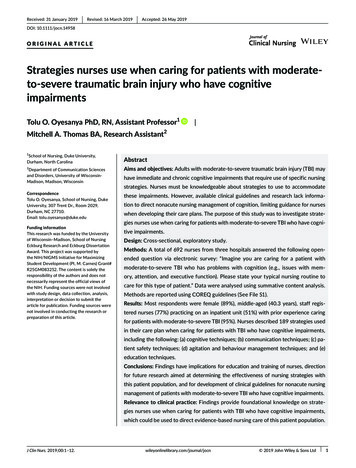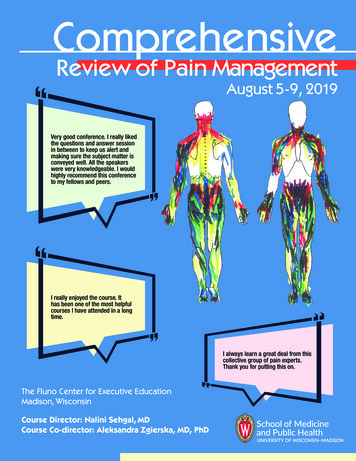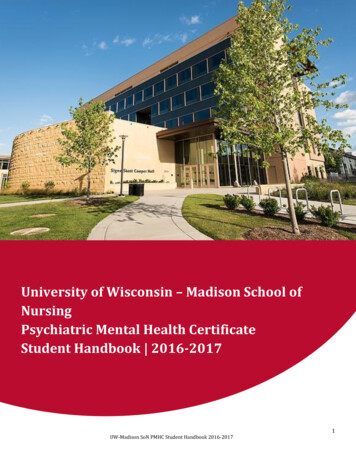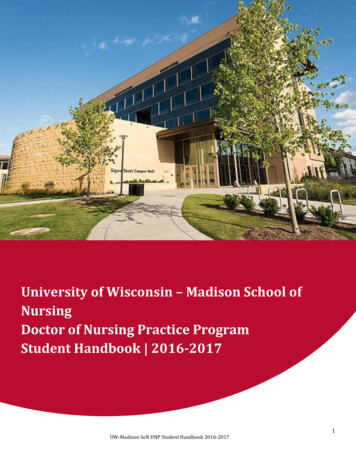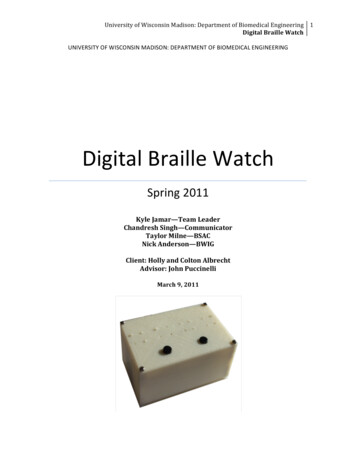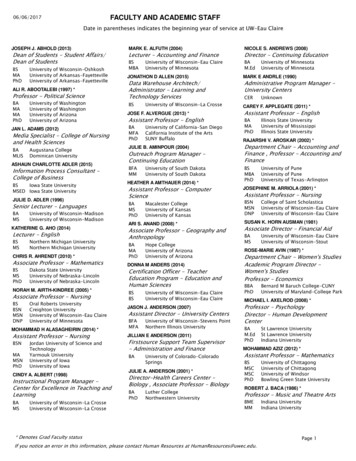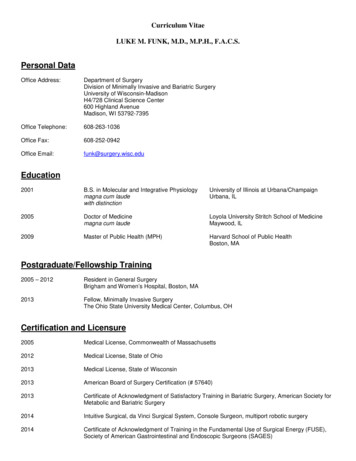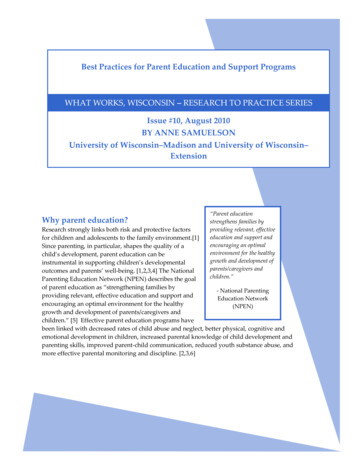
Transcription
Best Practices for Parent Education and Support ProgramsWHAT WORKS, WISCONSIN – RESEARCH TO PRACTICE SERIESIssue #10, August 2010BY ANNE SAMUELSONUniversity of Wisconsin–Madison and University of Wisconsin–ExtensionWhy parent education?“Parent educationstrengthens families byproviding relevant, effectiveeducation and support andencouraging an optimalenvironment for the healthygrowth and development ofparents/caregivers andchildren.”Research strongly links both risk and protective factorsfor children and adolescents to the family environment.[1]Since parenting, in particular, shapes the quality of achild’s development, parent education can beinstrumental in supporting children’s developmentaloutcomes and parents’ well-being. [1,2,3,4] The NationalParenting Education Network (NPEN) describes the goalof parent education as “strengthening families by- National Parentingproviding relevant, effective education and support andEducation Networkencouraging an optimal environment for the healthy(NPEN)growth and development of parents/caregivers andchildren.” [5] Effective parent education programs havebeen linked with decreased rates of child abuse and neglect, better physical, cognitive andemotional development in children, increased parental knowledge of child development andparenting skills, improved parent-child communication, reduced youth substance abuse, andmore effective parental monitoring and discipline. [2,3,6]
What is effective parent education?Effective parent education programs come inmany forms and can be found in manylocations.Some effective parent educationprograms are universal - designed for anyparent - while others are targeted to a specificpopulation’s needs. Parent education can behome-based, group-based, or even providedthrough newsletters or community services.Given the reported success of a wide variety ofparent education programs, determining thebest practices in parent education is a challenge.Though more experimental studies are neededto better understand the necessary elements ofparent education programs, reviewing wellevaluated or evidence-based programs canilluminate many components of effective parenteducation programs. Evaluations of effectiveparent education programs typically describepopulation characteristics and assess programfeatures and processes. [7] The best practicesfrom these evaluations can be used to betterunderstand and replicate successful programs.Program CharacteristicsContent and CurriculumThe literature on parenting education suggeststhat the most effective programs maintain aclear and consistent focus on parenting skillsand developmental information. [7]Suchprograms work to strengthen family levelprotective factors through emphasizing familystrengths such as spending time together and bybuilding parents’ skills in monitoring,communication and showing affection. [1,3,8,9]Programs that aim to reduce family level riskfactors have also been shown to be effective.[1,10]For example, these programs may havecurricula that educate parents about how todecrease harsh and inconsistent parenting or tryto make families less socially isolated. Thoughmost successful programs are flexible andresponsive to participant’s expressed needs,programs need not reinvent the wheel.Evidence-based parent education programswhose curricula or programs can be purchasedand/or replicated are available. (See the ParentEducation Curricula and Evaluation Resources boxat the end of this paper for links to several lists.)Despite the availability of strong evidencebased parent education programs, manycommunities continue to use popular butuntested programs. [1,6] To maximize programeffectiveness, following a tested and provenprogram design with fidelity is essential,because changing pieces of a curriculum canchange the effect of a program. For instance,condensing an evidence-based program to ashorter time period or providing all the coursematerials at once in a mailing rather than ateach class session as recommended is likely toundermine the effectiveness of a program. If anevidence-based parent education curriculum orprogram can be found that closely matches acommunity’s needs, educators can implementthe program with fidelity while additionallylistening for and responding to uniqueparticipant needs.Program TimingThe earlier in a family’s development a programis delivered, the greater the chance it will beeffective. Programs that work with parents ofyoung children can help families avoid the laterdevelopment of negative behaviors and set thestage for positive parent-child relationships inthe future. [1,10] Programs targeted at differentstages of family development, however, canalso be efficacious. Programs that reach familiesduring transitional times, such as birth and thefirst year of a child’s life, beginning school orBest Practices for Parent Education and Support ProgramsWhat Works, Wisconsin – 102
the onset of puberty, are especially effectivesince parents are interested in acquiring thedevelopmental knowledge necessary to dealwith the “next step” in parenting. [8,9,10]Clustering parent education programs aroundthese transitions, developmental stages orspecial needs of a child is powerful, becauseparents with children at the same stages havesimilar experiences. [1,9] For instance, parentswith toddlers are likely to be excited andexasperated by communicating with theirincreasingly verbal child; while parents ofteenagers may be struggling with establishingrules regarding how much time their teensspend with friends.Many effective programs also include bothparents and children. [8,10] Programs forparents with young children may simplyprovide quality childcare while parents meet oroffer opportunities for parents to practice newskills with their children, but programs servingfamilies with older children may benefit frominvolving children and teens in the program. Aparent and child centered program may haveseparate groups for parents and children thatmeet at the same time or have a parentdiscussion group proceeded or followed by anactivity for parents and children to do together.Program DeliveryWhile there are many ways to deliver parenteducation, perhaps the two most commonforms are group-based parent educationprograms and home-based parent educationprograms. Both group-based and home-basedparent education program delivery methodshave been shown to improve parent and childoutcomes. [7] The type of parent educationdelivery method used depends on participantneeds and program goals. For instance, homevisiting programs (one-on-one parent educationapproach) typically target families at risk forchild maltreatment, poor health outcomes,and/or poor school readiness. [9] Alternatively,group-based parent education programs areoften offered to a universal audience so they areless effective on the more problematic outcomestypically addressed in home-visiting programs;but group-based programs are often lessexpensive and have been shown to buildparenting skills and support positive childbehavior. [2] Some evaluations have shown thegreatest success from programs that combinedelivery methods and include both group-basededucation and home visits. [7]Best Practices for Parent Education and Support ProgramsWhat Works, Wisconsin – 10Characteristics of Effective ParentEducation Programs Focus on child development andparenting skills Reach families during times oftransition Support the strengths of families Actively engage participants Maintain frequent and sustainedcontact with parents Contact families using multiplemethods Catch families before problembehaviors begin Have well-trained, professional staff Hire warm, engaging and respectfulstaff Connect with other communityorganizations and resources Include parents AND children/teens Know population and meetparticipants’ special needs3
Teaching MethodStaffThe active engagement of parents has beenshown to predict the magnitude of a parenteducation program’s effect. [7] In other words,the more actively parents are engaged inapplying what they are learning, the more theparents learn or grow from their involvement inthe program. Interactive approaches such asrole-playing and encouraging parents topractice skills with their children are examplesof active learning and allow time forparticipants to practice their new knowledgeand skills. [1,10]Research shows that professionals from manyfields, including social work and nursing, havetaught parent education with success. [3]Programs staffed with professionals are s. [3,7] Home visit programshave shown stronger effects when nursesimplemented the program, because programparticipants viewed the nurse as an authoritywhose advice should be followed. [7] As arelatively new field, parent education does nothave regulated standards for practitionereducation. However, the National ParentingEducation Network’s (NPEN) website forprofessional development lists several degreesand certifications available to professionalswishing to hone their parent education skillsand knowledge. Given the importance of staffto the success of parent education programs,investing in parent education training for bothprofessional and paraprofessional staff can beimportant for program success. [7,11] Parenteducators who appear credible to parents arebetter able to build rapport and have a greaterimpact when implementing the program.Program MethodAdditionally, frequent and sustained contactwith parents has been shown to be important tosuccessful programs. [7,9] Unfortunately, littleinformation exists on precisely how often andfor how long programs should meet. It isknown that regular, repeated exposure to aconcept or a skill helps parents integrate theskill into their everyday habits. [3] Programsthat last over two years, however, have hadtrouble retaining participants. [3] A programmeeting weekly for 3-6 months (12-24 sessions)may be reasonable for most groups. (Somefunders will not even give grants to programswith less than 8 sessions. [9]) Higher riskfamilies especially benefit from more frequentand sustained program contact. [10] Increasingprogram time allows families to develop trustand change dysfunctional attitudes orbehaviors. Some scholars have suggested thathigh-risk families would ideally get 30-40 hoursof program contact overall and receive multipleprogram contacts each week via class, a homevisit, and/or newsletter. [1] However, thenumber of contact hours will probably dependon the level of risk and the problems faced by afamily.Though staff credibility may in part be relatedto professional skills, characteristics such aswarmth, genuineness, flexibility, humor, andempathy, communication skills, and sensitivityto family and group processes are highly relatedto the success of parenting education programs.[1, 3, 9, 11]Best Practices for Parent Education and Support ProgramsWhat Works, Wisconsin – 104
Ecological PerspectiveRecent research has indicated that the cultureand capacities of organizations can impact howwell programs are implemented. [7] Effectiveprograms usually take an ecological approachby considering all the influences (e.g., school,extended family, financial, work) on a family.[8,9]Some programs may reinforce andcomplement efforts already being made byother organizations, such as schools or faithcommunities. [9,10] For example, programsthat pair a school-based component with aparenting program may have increased successbecause they support consistency betweenschool and home. Similarly, the context ofparenting programs can be expanded throughcollaboration with other community agencies.[8] Linking parents to other needed services canimprove parenting programs and increaseparental success.Participant CharacteristicsEffective programs recognize the special needsand cultural traditions of the families they serveand match materials and programs to thedifferent needs of particular audiences.[1,3,10,12] Population characteristics such asrace, income or education level are important toconsider when selecting and implementing aparenting education program. [7] For instance,though research connects poverty with lessresponsive, warm parenting and decreasedchild well-being, programs targeting lowincome families are unlikely to be successful ifthey first attempt to improve parenting skills;they must first help parents meet basic needsbefore parent education will be successful. [1]Participant characteristics may alter how aprogram is designed and implemented.Culturally AdaptedSince the majority of parent education programsare intended for the mainstream U.S. culture,recruiting and retaining minority families inuniversal parent education programs is often achallenge. [12]Thus, culturally adaptedprograms that are tailored to the language,traditions, rituals, beliefs, and values of a groupcan increase program effectiveness withminority groups. [12]Effective culturallyadapted parent education programs considerthe following issues: 1) Is there a staff memberwho represents this cultural group?; 2) How dothe values and parenting methods of this groupdiffer from the mainstream values andparenting methods?; 3) Is extended familyimportant to this group? Should they beincluded in the program?; and 4) Howacculturated are these families? Are the parentsless acculturated than the children? [1] Even ifa program is unable to meet each of thesecriteria, such as hiring a staff member whorepresents a cultural group, consideration of thedifferent aspects of cultural adaptation canincrease the cultural sensitivity of anorganization. Research findings are often usedto adapt programs to different cultural groups;however, much of the research on minoritiesconcerns low-income populations so theadaptations for middle or upper class minorityfamilies may be very different. [1] Severalevaluations have shown that programsincreased parent retention by 30-40% afterswitching to a culturally adapted program. [12]Since parents need to attend and return to aprogram to learn new behaviors, improvedparticipant retention is necessary for success.Best Practices for Parent Education and Support ProgramsWhat Works, Wisconsin – 105
Parents of AdolescentsParents of adolescents represent anotherimportant parent education population. Periodsof transition, such as puberty, are times wheninterventions are most effective so parenteducation programs for parents of teenagershave great potential to see a measurableprogram impact. Parenting duties during theteen years can be summarized in five tasks: 1)love and connect, 2) monitor and observe, 3)guide and limit, 4) model and consult, and 5)provide and advocate. [13]The mostconsistently protective factor for adolescentdevelopment is a positive relationship with aparent. [1,13] Thus, parent education programsfor parents with teenagers should aim tosupport a warm and communicative parentchild relationship.Developmentally, manyteenagers have not developed the capacity tomake responsible decisions so teenagers oftenengage in risky behaviors. [1] Interventions areunlikely to train teenagers to stop these riskybehaviors until their brains are more fullydeveloped.However, parent educationprograms can work with parents to developmethods for limiting teenager’s opportunitiesfor risky behavior. [1,13]Finally, parenteducation programs for parents with teenagerscan help parents and teens transition into theteen’s growing need to spend more time withpeers. [1]SummaryWhen carefully examined, the key componentsof well-evaluated or evidence-based programscan serve as guidelines for the creation,implementation and evaluation of qualityparent education programs. Programs adheringto the best practices in parent educationParent Education Curricula andEvaluation ResourcesWhat Works, Wisconsin Evidence-basedParenting Program works.cfmUniversity of Minnesota SupplementalResource (with Curricula C/parent-framework.htmlCornell’s Parenting in Context EvaluationGuide www.parenting.cit.cornell.eduNational Parenting Education Network’sEvaluation Guide www.npen.orgWisconsin Children’s Trust Fund ProgramImpact and Evaluation rograms will carefully consider both programand participant characteristics. By followingthese best practices in parent educationprograms, practitioners can increase theirchances of delivering programs that willstrengthen parenting and enhance the wellbeing of children.Well designed programs that are implementedby caring and knowledgeable staff can havepositive short- and long-term impacts on thequality of parent-child relationships andchildren’s development.Best Practices for Parent Education and Support ProgramsWhat Works, Wisconsin – 106
References1. Brown, M. B. (2005). Parent educationand support literature review 2005.University of Delaware CooperativeExtension. Retrieved November 1, onalresources/parentEd/2005litreview.htm2. Bunting, L. (2004). Parentingprogrammes: The best availableevidence. Child Care in Practice, 10(4),327-343.3. Carter, N. (1996). See how we grow: Areport of parenting education in the U.S.The Pew Charitable Trust Foundation.Retrieved November 21, 2009, fromhttp://npen.org/resources/papers.html4. MN Early Childhood Family Education.(2008). Parent Education CoreCurriculum Framework and Indicators.MN Early Childhood Family Education.Retrieved November 1, 2009, -framework.html5. NPEN Core Principles. (n.d.). NationalParenting Education Network CorePrinciples. In NPEN: National ParentingEducation Network. Retrieved November1, 2009, fromhttp://www.npen.org/work/coreprinciples.html6. Small, S. A. & Mather, R. S. (2009). Whatworks, Wisconsin evidence-basedparenting program directory. Madison,WI: University of Wisconsin –Madison/Extension. Retrieved October 26,2009, .cfmFinding effective solutions to truancy – ReferencesWhat Works, Wisconsin – Research to Practice Series - 107. Powell, D. R. (2005). Searches for whatworks in parenting interventions. In T.Luster & L. Okagaki (Eds.), Parenting:An Ecological Perspective (pp. 343-373).Mahwah, NJ: Lawrence ErlbaumAssociates.8. Colosi, L. & Dunifon, R. (2003). Effectiveparent education programs. CornellCooperative Extension. Retrieved October26, 2009, fromhttp://www.parenting.cit.cornell.edu/research briefs.html9. Riley, D. (1993). Some principles fordesigning effective parentingeducation/support programs. Wisconsinfamily impact seminars briefing report.University of Wisconsin-Madison:Center for Excellence in Family Studies.Retrieved October 26, 2009, 2.pdf10. Huser, M., Small, S. A., & Eastman, G.(2008). What research tells us abouteffective parenting education programs.What Works, Wisconsin Fact Sheet.Madison, WI: University of Wisconsin –Madison/Extension. Retrieved October26, 2009, .cfm11. Greder, K. (2004). Iowa curriculumstrengthens core competencies ofparenting educators. Journal of Familyand Consumer Sciences, 96(4).12. Kumpfer, K. L., Alvarado, R., Smith, P.,& Bellamy, N. (2002). Culturalsensitivity and adaptation in familybased prevention interventions.Prevention Science, 3, 241-246.13. Simpson, A. R. (2001). Raising teens: Asynthesis of research and a foundation for7
action. Boston: Center for HealthCommunication, Harvard School ofPublic Health. Retrieved November 22,2009, fromhttp://hrweb.mit.edu/worklife/rpteens.html14. Jacobs, F. (2003). Child and familyprogram evaluation: Learning to enjoycomplexity. Applied DevelopmentalScience, 7(2), 62-75.15. Taylor-Powell, E. & Henert, E. (2008).Developing a logic model: Teaching andtraining guide. Madison, WI: Universityof Wisconsin Extension, ProgramDevelopment and Evaluation. RetrievedDecember 4, 2009, logicmodel.html16. Radar, S. N. & Cooke, B. (n.d.).Suggestions for evaluating parenteducation programs. In NPEN: NationalParenting Education Network. RetrievedOctober 26, 2009, fromhttp://npen.org/work/evaluating/index.htmlWHAT WORKS, WISCONSIN: RESEARCH TO PRACTICE SERIESThis is one of a series of Research to Practice briefs prepared by the What Works, Wisconsin team at the Universityof Wisconsin–Madison, School of Human Ecology, and Cooperative Extension, University of Wisconsin–Extension. All of the briefs can be downloaded from www.uwex.edu/ces/flp/families/whatworks.cfm.This publication may be cited without permission provided the source is identified as: Samuelson, Anne (2010).Best practices for present education and support programs. What Works, Wisconsin Research to Practice Series, 10.Madison, WI: University of Wisconsin–Madison/Extension.Finding effective solutions to truancy – ReferencesWhat Works, Wisconsin – Research to Practice Series - 108
features and processes. [7] The best practices from these evaluations can be used to better understand and replicate successful programs. Program Characteristics Content and Curriculum The literature on parenting education suggests that the most effective programs maintain a clear and consistent focus on parenting skills
